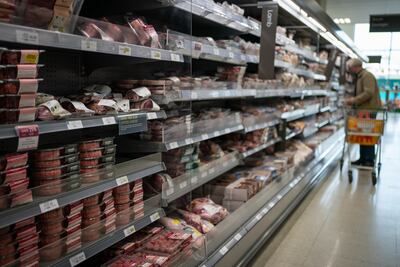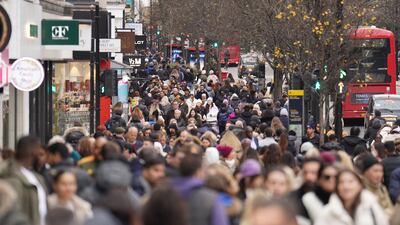UK retail sales volumes fell unexpectedly in December, by 1 per cent compared to the month before, according to the Office for National Statistics.
A poll of economists by Reuters had forecast a 0.5 per cent rise in the Christmas month, which is vital to the fortunes of retailers.
The ONS noted that the divergence between sales volumes and sales values continues to expand, as inflation rises. Inflation in the UK is running at 10.5 per cent.
Retail sales values, unadjusted for price changes, fell by 1.2 per cent in December, following a rise of 0.5 per cent in November. When compared with the pre-coronavirus level in February 2020, total retail sales were 13.6 per cent higher in value terms, but volumes were 1.7 per cent lower.
In the run-up to Christmas, a survey by the ONS showed 60 per cent of adults were planning to cut back on the amount they spent over the festive season, with 79 per cent saying they would be buying fewer presents.
Total non-food stores sales volumes, from department stores, clothing and household stores and so on, fell by 2.1 per cent over the month.
“There was continued feedback from retailers suggesting that consumers are cutting back on spending because of increased prices and affordability concerns,” the ONS said.
Shops that sold cosmetics, toys and games, sports equipment and jewellery fared particularly badly. Their sales volumes fell by 6.2 per cent in December.

Food prices
Food store sales volumes fell by 0.3 per cent in December, after a rise of 1 per cent in November.
“Feedback from some retailers suggested that the November increase was because of customers stocking up early for Christmas,” the ONS said.
Food price inflation rose to 16.9 per cent in the 12 months to December, following a rise of 16.5 per cent in November. Food prices in the UK have risen for 17 consecutive months.
Helen Dickinson, chief executive of the British Retail Consortium, said: “Many of the cost pressures bearing down on retailers and their customers remain in 2023, with high energy costs, the war in Ukraine and domestic labour shortages all taking their toll. However, BRC modelling suggests the situation will improve in the second half of the year.”
Inflation has 'turned a corner'
Meanwhile, the Governor of the Bank of England said that “a corner had been turned” with inflation and that from the spring it is set to fall.
“What we think is the most likely outcome is that [inflation] will fall quite rapidly this year, probably starting in the late spring and that has a lot to do with energy pricing,” Andrew Bailey told Business Live during a visit to Wales on Thursday.
“There was a sort of locked in level of energy prices over the winter, but we expect it to fall quite rapidly after that, for at least a couple of reasons.”
“One, it is a bit of arithmetic in the sense as it is of course an annual calculation so the big base effects from last year will start to fall out, and unless something happens it will start to fall quite rapidly, actually, as we showed in our November monetary policy report.
“The other thing that has happened really in the last couple of months is that particularly energy prices have started to come off and gas prices quite a lot actually since the beginning of the winter.”
“That isn't actually yet feeding through, because of the way in which particularly domestic prices are calculated, but it will do,” he added.

Falling confidence
However, the latest survey on British consumer confidence from the research firm GfK released on Friday shows that confidence is falling, as soaring energy costs bite into household budgets and inflation erodes the value of wages.
GfK’s monthly consumer confidence index, a measure of how people see their personal financial positions, slipped to minus 45 this month, three points lower than in December.
“With inflation continuing to swallow up pay rises, and the prospect of some shocking energy bills landing soon, the forecast for consumer confidence this year is not looking good. One thing we can be sure of is that 2023 promises to be a bumpy ride,” said Joe Staton, client strategy director at GfK.


